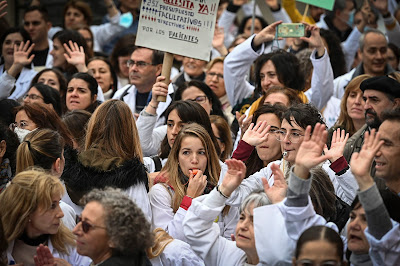Tras diez días de huelga de pediatras y médicos de familia estamos agotados. En la época de la movida solían decir aquello de “Madrid me mata” por la intensidad del ritmo de vida y los excesos de la noche. Hoy lo podemos retomar dado que la actual coyuntura y el pasotismo de la Consejería de Sanidad van a acabar con gran cantidad de facultativos y no es retórica. La sobrecarga laboral mantenida es tóxica pero es que la narrativa de decadencia que tenemos en la cabeza lo es mucho más. La distopía sanitaria que protagonizamos nos aboca al final de los tiempos de la Atención Primaria que conocíamos y muchos no dejan de pensar en un juicio final de llanto y crujir de dientes. Pensamientos de ruina y sentimientos de fracaso y desesperanza se nos quedan pegados como aquel chapapote espeso y negro que tiñó las costas gallegas hace unos años. Los sueños quedan contaminados de ese olor y nuestros amigos y seres queridos nos ven cabizbajos y agobiados.
La situación es una catástrofe vital para muchos de nosotros semejante a la que cada día nos presentan nuestros pacientes a los que damos de baja y medicamos en muchas ocasiones por niveles de sufrimiento semejantes al nuestro. Pero así no podemos seguir. Ya estamos muchos medicados y otros tantos en terapia, en breve seremos más. No es mantenible. Nos falta una narrativa nueva, una buena noticia, algo que nos de un poco de esperanza. Quizá a alguno le ayuden sus creencias o su fe. Pero aquí nos hace falta algo que sea posible compartir entre todos, una senda que nos saque de este círculo infernal de queja y podredumbre que no descansa nunca.
Hace falta silencio. Valor para caminar hacia el desierto vacío y silencioso que cada cual alberga dentro de sí mismo. Y allí escuchar. Habitualmente si conseguimos insistir se termina oyendo una leve voz interior que nos conforta, la misma que escuchan místicos, artistas y locos. Entre tanto grito es bien difícil pero así como nuestros pacientes lo consiguen y terminan saliendo de sus cuitas, también para uno hay salvación.
La situación es tan dura para muchos que estoy intentando sistematizar lo que resumo en estas líneas en un texto más amplio y en un taller que, si los elementos lo permiten, impartiré con la dra. Isabel Núñez en el Congreso de Comunicación de la Semfyc dentro de unos meses. Hablar de escatología sanitaria y catástrofes vitales tal vez escandalice a alguno pero ha llegado el tiempo de atrevernos con planteamientos nuevos dadas las dificultades y limitaciones de las distintas mesas sectoriales, donde la Administración suele ser quien meta los goles haciendo más o menos trampa.
Bonus Track: recién publicado hoy
La crisis sanitaria ¿es irreversible?
https://www.sciencedirect.com/science/article/pii/S2605073022000335
Health care asphalt stain
After ten days of strike in Madrid by paediatricians and family doctors, we are exhausted. In the days of the "movida" they used to say "Madrid kills me" because of the intensity of the pace of life and the excesses of the night. Today we can take it up again, given that the current situation and the passivity of the Regional Ministry of Health are going to do away with a large number of doctors, and this is not rhetoric. The sustained work overload is toxic, but the narrative of decadence we have in our heads is much more so. The healthcare dystopia we are witnessing is leading us to the end of the days of primary care as we knew it, and many cannot help but think of a final judgement of weeping and gnashing of teeth. Thoughts of ruin and feelings of failure and despair stick to us like that thick, black tar that stained the Galician coast a few years ago. Dreams are contaminated by that smell and our friends and loved ones see us crestfallen and overwhelmed.
The situation is a vital catastrophe for many of us, similar to what our patients present to us every day, whom we discharge and medicate on many occasions due to levels of suffering similar to our own. But we cannot go on like this, not for long. Many of us are already on medication and many others are in therapy, and soon there will be more. It is not sustainable. We need a new narrative, some good news, something to give us a little hope. Maybe some people are helped by their beliefs or their faith. But here we need something that we can all share, a path that will take us out of this infernal circle of complaint and rottenness that never rests.
We need silence. Courage to walk towards the empty and silent desert that each one of us harbours within ourselves. And there to listen. Usually, if we manage to insist, we end up hearing a faint inner voice that comforts us, the same one heard by mystics, artists and madmen. In the midst of so much shouting it is very difficult, but just as our patients manage to get out of their troubles, there is also salvation for us.
The situation is so hard for many that I am trying to systematise what I am summarising in these lines in a broader text and in a workshop which, if the elements permit, I will give with Dr Isabel Núñez at the Semfyc Communication Congress in a few months' time. Talking about health scatology and vital catastrophes may scandalise some, but the time has come to dare to take new approaches, given the difficulties and limitations of the different sectoral roundtables, where the Administration is usually the one who scores the goals by cheating to a greater or lesser extent.
卫生级粘稠沥青
机器翻译,抱歉有错误。
在儿科医生和家庭医生罢工十天后,我们已经筋疲力尽。在movida时代,他们常说 "马德里杀了我",因为生活节奏的强度和夜晚的过度。今天我们可以再接再厉,鉴于目前的情况和地区卫生部的消极怠工将使大量的医生消失,而这并不是说辞。持续的工作超负荷是有毒的,但我们脑海中的颓废叙事则更加有毒。我们正在目睹的医疗保健二元结构正将我们引向我们所知道的初级保健时代的终结,许多人不禁想到了哭泣和咬牙切齿的最终审判。毁灭的想法以及失败和绝望的感觉就像几年前沾染在加利西亚海岸的厚厚的黑色焦油一样粘在我们身上。梦境被这种气味所污染,我们的朋友和亲人看到我们沮丧和不知所措。
这种情况对我们中的许多人来说是一场重要的灾难,类似于我们的病人每天呈现给我们的情况,我们在许多场合为他们出院和用药,因为他们的痛苦程度类似于我们自己。但我们不能再这样下去了,不能长久。我们中的许多人已经在接受药物治疗,还有许多人在接受治疗,很快就会有更多的人。它是不可持续的。我们需要一个新的叙述,一些好消息,给我们一点希望的东西。也许有些人因为他们的信仰或他们的信念而得到帮助。但在这里,我们需要一些我们都能分享的东西,一条能带我们走出这个抱怨和腐烂的无间道的道路,它永远不会停止。
我们需要沉默。有勇气走向我们每个人内心所怀有的空虚和沉默的沙漠。并在那里倾听。通常情况下,如果我们设法坚持,我们最终会听到一个微弱的内心声音,安慰我们,也就是神秘主义者、艺术家和疯子听到的那个声音。在如此多的呼喊声中,这是非常困难的,但正如我们的病人设法走出困境一样,我们也有救赎。
这种情况对许多人来说是如此艰难,以至于我正试图将我在这几行中总结的内容系统化,并在一个研讨会上进行讨论,如果条件允许,我将与伊莎贝尔-努涅斯博士一起在几个月后的Semfyc交流大会上进行讨论。谈论健康粪便学和重要的灾难可能会让一些人感到羞愧,但现在已经到了敢于采取新方法的时候了,因为不同部门的圆桌会议存在困难和局限性,在这些会议上,政府通常是通过或多或少的作弊来实现目标的。








.png)


.jpeg)









.png)